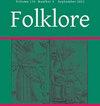亡者归来之夜:来自十八世纪北京“夜话”的五种致命亡者(沙)描述
IF 0.2
4区 社会学
0 FOLKLORE
引用次数: 0
摘要
和邦锷的《夜谈记》是一本18世纪晚期的中国“异常记录”集。在大约140件藏品中,“死而复生五件”特别涉及中国人的一种信仰,即死人会在特定的一天以死而复生的形式回到他或她以前的家。这篇文章除了提供了一个注释翻译的“回沙武则”,还阐述了“尸祭”的独特性,并揭示了迄今为止尚未得到充分研究的与中国本土宗教密切相关的殡葬仪式的丰富文化历史。本文章由计算机程序翻译,如有差异,请以英文原文为准。
On the Night the Dead Return: Five Accounts of Fatal Revenants (Sha) from ‘Nighttime Talks’ in Eighteenth-Century Beijing
Abstract Yetan suilu (Jottings of nighttime talks) by Hebang’e is a late eighteenth-century Chinese collection of ‘anomaly accounts’. Among the roughly 140 entries in the collection, ‘Huisha wuze’ (Five items on fatal revenants) deals particularly with the Chinese belief that a dead person would visit his or her former home on a specific day in the form of a fatal revenant (sha). Besides providing an annotated translation of ‘Huisha wuze’, this article also explicates the uniqueness of the sha-revenant and sheds light on the rich cultural history of a hitherto understudied mortuary ritual that has close connections to Chinese vernacular religion.
求助全文
通过发布文献求助,成功后即可免费获取论文全文。
去求助
来源期刊

FOLKLORE
FOLKLORE-
CiteScore
0.60
自引率
25.00%
发文量
0
期刊介绍:
A fully peer-reviewed international journal of folklore and folkloristics. Folklore is one of the earliest journals in the field of folkloristics, first published as The Folk-Lore Record in 1878. Folklore publishes ethnographical and analytical essays on vernacular culture worldwide, specializing in traditional narrative, language, music, song, dance, drama, foodways, medicine, arts and crafts, popular religion, and belief. It reviews current studies in a wide range of adjacent disciplines including anthropology, cultural studies, ethnology, history, literature, and religion. Folklore prides itself on its special mix of reviews, analysis, ethnography, and debate; its combination of European and North American approaches to the study of folklore; and its coverage not only of the materials and processes of folklore, but also of the history, methods, and theory of folkloristics. Folklore aims to be lively, informative and accessible, while maintaining high standards of scholarship.
 求助内容:
求助内容: 应助结果提醒方式:
应助结果提醒方式:


